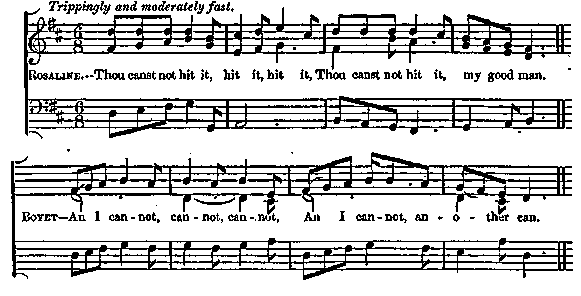Popular Music Of The Olden Time Vol 1
Ancient Songs, Ballads, & Dance Tunes, Sheet Music & Lyrics - online book
| Share page | Visit Us On FB |
|
ILLUSTRATING SHAKESPEARE. |
239 |
|||
|
My pains who can express?
Alas! they are so strong; My dolour will not suffer strength
My life for to prolong. Toll on, &c.
Alone in prison strong
I wail my destiny; Woe worth this cruel hap that I
Should taste this misery. Toll on, &c. |
Farewell my pleasures past,
Welcome my present pain ; I feel my torments so increase,
That life cannot remain. Cease now the passing bell, Rung is my doleful knell, For the sound my death doth tell. Death doth draw nigh, Sound my end dolefully, For now I die. |
|||
|
CAN YOU NOT HIT IT, MY GOOD MAN? The following lines are sung by Rosaline and Boyet in act iv., sc. 1, of Love's Labour Lost. The tune was transcribed by Dr. Rimbault from one of the MSS. presented by Bishop Fell to the Music School at Oxford, and bearing a date of 1620. Canst thou not hit it is mentioned as a dance in the play of Wily Beguiled, written in the reign of Elizabeth. In 1579, " a ballat intytuled There is better game, if you could hit it," was licensed to Hughe Jaxon. |
||||
|
|
||||
 |
||||
|
The list of music illustrating Shakespeare might be largely increased, by including in it catches, part-music, and the "works of known composers, which do not fall within the scope of the present collection. The admirers of Shakespeare will be gratified to know that a work is in progress which will include not only those, but also such of the original music to his dramas as can still be found.a
The three following ballads, with which I close the reign of Elizabeth, were popular in the time of Shakespeare, but are not mentioned by the great poet, |
||||
|
|
||||
|
* This work (to -which Dr. Rimbault has devoted many years of zealous research) will be entitled " A Collection of Ancient Music, illustrating the plays and poems of Shakespeare." The first portion will contain all that now remains of the original music to his dramas, or which, if not composed for the first representation of them, was written during the life-time of the poet. The whole of |
the music of The Tempest will be included in this part. Another division will contain the old songs, ballads, catches, &c, inserted, or alluded to, by Shakespeare. The dances will form the third part. It was owing to researches on a subject so much akin to that of the present Collection, that Dr. Rimbault's aid has been so peculiarly valuable in this work. |
|||